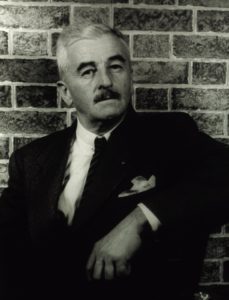
Acclaimed authors – from literary giants to local writers – have called the University of Mississippi home. The influence of these writers is tangible on campus and in Oxford.
One of the most lauded writers connected to UM and the state needs no introduction. William Faulkner (1897-1962) remains one of the most highly decorated and highly recognizable writers in Southern and American literature.
Faulkner spent the majority of his life in Oxford, eventually attending UM before dropping out after three semesters. According to Director of Southern Studies and Professor of English Kathryn McKee, though, Faulkner’s connection to the university and Oxford is much deeper than his short tenure as a student.
“(Faulkner) was growing up as the university was growing up,” McKee said. “His imaginary world (in his writing) was Yoknapatawpha County, which bears some relationship to this part of Mississippi, because he was creating that world while he was living here in Oxford.”
Faulkner based many of his novels and stories in the fictional Yoknapatawpha County, an “apocryphal county” largely based on Lafayette County according to the author himself.
UM has several programs and exhibits both preserving and contextualizing his life and work. The university coordinates and hosts the annual Faulkner and Yoknapatawpha Conference, owns the writer’s home, Rowan Oak, and has several classes dedicated to the study of his work.
“Our understanding of Faulkner and how he relates to his own time period and his ongoing significance to contemporary writers is always evolving, and the Faulkner and Yoknapatawpha Conference (exemplifies that),” McKee said.
Faulkner’s work can help readers visualize different relevant issues within the United States beyond Mississippi and the South, McKee said.
“I think Faulkner always seemed to understand that the issues he’s grappling with in his fiction are relevant not just to people in Mississippi, but also to people in the broader South and to people in the broader nation,” McKee said. “We can do worse than Faulkner as a guide to really grappling with some of the very basic challenges to our ideals of America.”
Another writer associated with UM was Willie Morris (1934-1999). Born in Jackson, Miss., he attended the University of Texas at Austin and later studied at the University of Oxford as a Rhodes scholar. Upon graduation, he worked in various publishing jobs in New York until 1967 when he became the youngest editor of “Harper’s Magazine,” the oldest continuously published magazine in the United States.
Despite spending much of his career outside of Mississippi and the South, he eventually returned to his home state and took a position as a creative writing professor at UM.
Whereas writers such as Faulker are remembered for their rendering of Mississippi and the South through their fiction, much of Morris’s renown comes from his skill as a memoirist and his perspective as a Southerner away from his home region.
“(Morris’s writing) has a memoir aesthetic and is reflective about how place has shaped him,” McKee said. “He spent a lot of time out of the South, looking back on the South from the vantage point of somewhere else.”
Aside from his own writing, Morris is also remembered for the impression he left on other young Mississippi writers from his time as a professor.
“(Morris) was invested in the university as an institution of learning and invested in students being prepared to become writers and thinkers through the university,” McKee said. “He was a kind of outsized character in university life.”
After his death, Morris became the subject of several biographies and tributes such as “Remembering Willie” and “Conversations with Willie Morris,” both published by the University Press of Mississippi.
Remembered for his impact on Southern writers and his care for the South and its people, Morris is also the namesake of the Willie Morris Awards for Southern Writing.
One student mentored by Morris is the successful novelist John Grisham, who attended law school at UM. Grisham has written 47 consecutive No. 1 fiction best-sellers, most of them legal thrillers, and his books have sold more than 300 million copies.
Today, Grisham still bears a connection to the university, with the John and Renée Grisham Writers in Residence program named in his honor.
“Oxford was very important to John Grisham’s career as he was living here when his career got started as a writer. For a long time, when he had a new book coming out, the first place it would be available was through Square Books,” McKee said. “He had an important relationship with the bookstore, with the town and then later with the university when he lived in Oxford. So I think his long shadow as a writer can still be felt (in Oxford).”
While Oxford and the university have historically been home to many prominent writers, there is still a vibrant community of writers here, according to McKee — particularly the faculty and students of the MFA English program.
“Oxford is full of writers. (The university) has an MFA English program with a national reputation,” McKee said. “So the University of Mississippi goes on shaping writing in important ways — not just the literature of Mississippi or the literature of the South, but American literature.”
